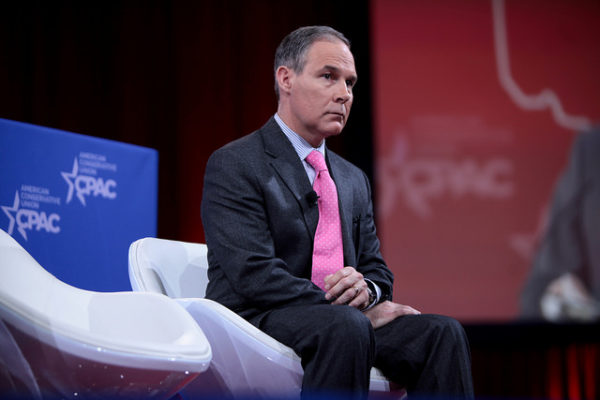
December 7, 2016; New York Times
Scott Pruitt has been selected by Donald Trump to be the next head of the Environmental Protection Agency. Pruitt’s selection is both controversial and alarming, given his persistent criticism of the EPA and his relationships with fossil fuel interests in energy-rich Oklahoma. Clean energy and other environmental interests are lining up to oppose Pruitt’s nomination.
Pruitt, 48, is an attorney who served eight years in the Oklahoma state senate prior to being elected attorney general in 2010. As AG, he established a “federalism unit” and has prided himself on contesting what he sees as federal “command and control” regulatory overreach into state matters. For example, he points to the Clean Water Act, which he says was originally passed by Congress to allow the federal government to protect “navigable waterways” but which authority was expanded by the Obama administration to include any water source “with a nexus to a navigable waterway.” Oklahoma and other states filed a lawsuit which has been successful in halting the imposition of the Waters of the United States (WOTUS) regulations pending a federal court trial on whether the EPA had the authority to issue the regulations and whether the EPA followed proper procedure in developing the regulations. Oklahoma is also one of 29 states challenging the EPA’s Clean Power Plan in federal court.
He has parted from fellow state attorneys general in the practice of using external plaintiffs’ attorneys to pursue class action lawsuits against corporate interests. In an interview last year at the conservative Manhattan Institute, Pruitt bragged about Oklahoma being the only state that didn’t sign the multi-state settlement with the banking industry over mortgage abuses. He expressed concern that the suit had become an effort by states to raise state revenue by forcing a settlement.
“I filed our own prosecution against the banks and secured $16 million, which went to those who had actually been harmed,” Pruitt said.
Writing earlier this year about the coalition of state AGs investigating ExxonMobil over its actions and research on climate change, Pruitt said:
Scientists continue to disagree about the degree and extent of global warming and its connection to the actions of mankind. That debate should be encouraged—in classrooms, public forums, and the halls of Congress. It should not be silenced with threats of prosecution. Dissent is not a crime.
Opposition to Pruitt has been immediate and forceful. “It’s a safe assumption that Pruitt could be the most hostile E.P.A. administrator toward clean air and safe drinking water in history,” said Ken Cook, head of the Environmental Working Group.
Sign up for our free newsletters
Subscribe to NPQ's newsletters to have our top stories delivered directly to your inbox.
By signing up, you agree to our privacy policy and terms of use, and to receive messages from NPQ and our partners.
U.S. Sen. Bernie Sanders (I-VT) was one of several Democratic legislators alarmed at the announcement.
“At a time when climate change is the great environmental threat to the entire planet, it is sad and dangerous that Mr. Trump has nominated Scott Pruitt to lead the EPA,” said Senator Bernie Sanders, independent of Vermont, who sits on the committee that must confirm him. “The American people must demand leaders who are willing to transform our energy system away from fossil fuels. I will vigorously oppose this nomination.”
Massachusetts Sen. Ed Markey said, “The EPA is our cop on the beat, protecting the American people and our environment from harmful pollution, hazardous waste and the impacts of climate change. He has dedicated years of his career to rolling back the bedrock laws and rules that protect our water and our air.” Markey said, “Scott Pruitt would have EPA stand for ‘Every Polluter’s Ally.’”
“This is about the worst thing he could be doing for the environment and the American people,” said billionaire hedge fund-manager and climate activist Tom Steyer in an interview at Bloomberg headquarters in New York. Trump “continues to appoint people who are seriously unfit and unprepared for the jobs they need to do.”
Many farmer and rancher groups have expressed support for Pruitt. Zippy Duvall, president of the American Farm Bureau Federation, said in a statement Pruitt’s selection is “welcome news to America’s farmers and ranchers—in fact, to all who are threatened by EPA’s regulatory overreach—and should help provide a new degree of fairness for U.S. agriculture.”
Whoever heads the EPA, it may be too late for new federal regulations to stop the momentum of investors and market forces shifting away from a reliance on the most polluting fossil fuels and toward renewable energy sources. Moreover, some states such as California have enacted their own policies on greenhouse gas emissions. The Trump administration’s decisions will be important but not the only factor in the global effort to arrest climate change.
The challenge for opponents to Pruitt and any other Trump nominees is the Republican majority in the U.S. Senate. Ever since the then-Democratic majority implemented the “nuclear option” by excluding most presidential appointments from the Senate’s filibuster rule, only 51 votes are required to confirm cabinet nominees. There is speculation in political circles that Democrats may target one or two Trump appointees for vociferous opposition rather than attempting to oppose all nominees equally. Pruitt is a prime choice for this focused opposition because he can, based on his record and his own statements, be portrayed to the public as a foe of clean air and water who is sympathetic to the fossil fuel industry. Even if his nomination can’t be stopped, protest against it provides a potential public relations victory for environmental interests and Democrats looking for political support and political advantage.—Michael Wyland












